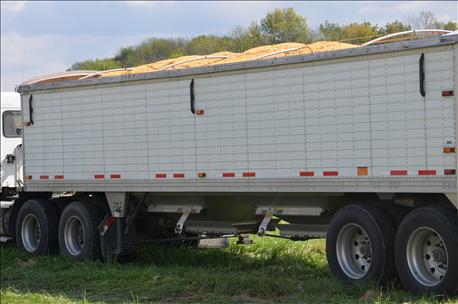
A recent story about lower fertilizer prices impacting 2017 crop budgets in a favorable way offered a glimmer of hope for some of you feeling like you’re about to drown in a sea of red ink. Corn and soybean prices are low across the Midwest. Some of you are finding disappointing corn yields, largely fueled by a dramatic disease outbreak late in the season. It’s adding insult to injury.

2016 CROP SUBPAR: Early reports indicate that while corn is good in many areas, disease took a bigger toll than expected. Will so-so yields and low prices impact landlords and cash rents?
When Michael Langemeier prepared the report on lower fertilizer prices, he also anticipated that cash rents would move lower, giving another boost to 2017 crop budgets and lowering the breakeven price for corn and soybeans in 2017. Langemeier is a Purdue University Extension ag economist and associate director of the Purdue Center for Commercial Agriculture.
Predicting that cash rents should soften, or thinking they will drop at least a bit, and cash rents actually dropping are two entirely different things. That’s what farmers we’ve talked to recently are saying. From what we hear, it may be premature to assume you can talk landowners into lower rent, even with so-so yields and low prices. Lower rents may make perfect economic sense given the conditions, but that doesn’t mean they will happen. Two factors come into play.
No. 1 is the human factor: Landowners are human and have varying ideas about what they should earn off their land. Many are absentee landowners and are removed from farming. Many also depend on that income to pay their bills or maintain the standard of living they are accustomed to these days.
No. 2 is the factor that it's not one world when it comes to farmers and their cost structures. Not only are some in a much different position than others, but also, some approach rents and expected profit margins with different goals. For some, low labor is the niche; for others, it’s minimal equipment cost because they run old equipment. The bottom line is that not everyone plays with the same deck, and for sure, not everyone uses the same pencil to calculate what they are willing to pay.
Some examples
Here are a couple of instances we have heard so far that would make one question if cash rents will drop significantly. It sounds like a case-by-case basis at this point.
One farmer related that his rent will actually go up next year, but not by a lot. Why? He and his primary landowner have only negotiated every five years. The landowner feels he wasn’t getting enough before and needs to make it up. In this case the farmer can still live with the new rent, so he’s going along. But he’s also insisting on a switch to annual renewal of a one-year lease with rights to renegotiate.
In a second case, a farmer who primarily cash-rents land is not only offering his existing landowners a healthy cash rent, not a reduced one, for 2017, but he’s also calling landowners with other tenants and asking if they would like to rent him their land at a higher rent. It might be hard to believe, but it’s still happening, even with corn around $3 per bushel and yields uncertain at best.
We still believe Greg Halich, the University of Kentucky Extension ag economist, was right when he penned a series of articles for us last winter saying that sooner or later, someone must blink in the cash-rent game. Otherwise, farm net equities will begin to decline.
This just may not be the year when everyone blinks.
About the Author(s)
You May Also Like




